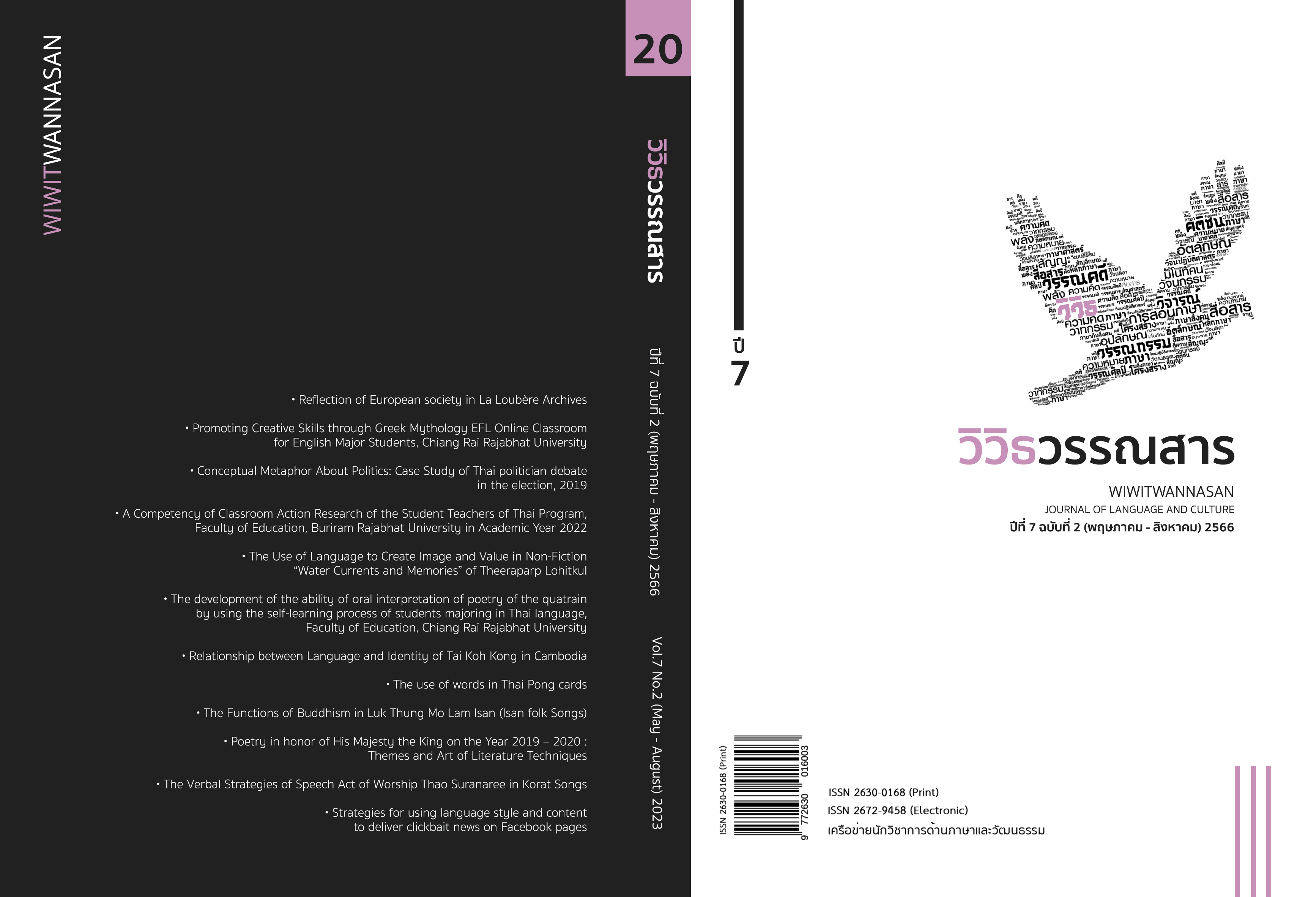การพัฒนาความสามารถในการอ่านทำนองเสนาะประเภทโคลงสี่สุภาพ โดยใช้กระบวนการเรียนรู้ด้วยตนเองของนักศึกษาวิชาเอกภาษาไทย คณะครุศาสตร์ มหาวิทยาลัยราชภัฏเชียงราย
Main Article Content
บทคัดย่อ
This research article aims to 1) Comparison of the scores for the reading ability of the Four polite poems melodies. before and after school by using the self-learning process of students majoring in Thai language, Faculty of Education, Chiang Rai Rajabhat University 2) to study the progression of the score ability to read melody Four polite poems while studying by using a self-learning process by using the self-learning process of the students. and 3) to study the students' satisfaction towards the self-learning process. The sample group was 2nd year student majoring in Thai language, Faculty of Education, Chiang Rai Rajabhat University who enrolled in the Art of Reading Aloud class In the second semester of the academic year 2022, there were 24 students in the AB group, obtained by purposive sampling. There are 4 types of research tools: 1) a tool used to develop the ability to read a melody in a melodious melody; 2) a tool used to test 3) Tools used to assess the test and 4) a tool to measure student satisfaction with learning activities. Statistics used for data analysis were percentage (%), mean ( ), standard deviation (S.D.), and t-test (t-test for one sample). The results showed that 1) The ability to test the reading of a melodious melody in the four polite verses using a self-learning process of students majoring in Thai Language, Faculty of Education, Chiang Rai Rajabhat University Post-learning was significantly higher than before at the .01 level. 2) Progression of proficiency test scores In reading a melody in the form of the four polite sonnets during the lesson by using the self-learning process of students The overall score of all tests was 84.15 percent, which is higher than the specified criteria. and 3) the students' satisfaction towards the self-learning process was higher than the specified criteria. which has the highest mean level.
Article Details

อนุญาตภายใต้เงื่อนไข Creative Commons Attribution-NonCommercial-NoDerivatives 4.0 International License.
ลิขสิทธิ์ของบทความเป็นของวารสาร การพิมพ์ซ้ำจะต้องได้ร้บการอนุญาตจากบรรณาธิการวารสาร
เอกสารอ้างอิง
Akanitthada, N. (2013). Melody path to aesthetics. Bangkok : Publisher of Chulalongkorn University.
Bell, B.F. (1993). Children’s Science, Constructivism and Learn in Science. Gelong: Deakin University Press.
Butdanoi, P. (2021). The Development of Learning Activities Based on Constructivist Theory and STAR Strategy to Enhance the Word Problem-Solving Ability and Learning Achievement in Chemistry on the Topic of Stoichiometry for Mathayomsuksa 4 Students. [Thesis Master of Education]. Mahasarakham University.
Cobb, P. Wood L. and Yakel, E. (1994). Constructivist Approach to Second Grade Mathematics. in E. Von Glasersfeld (ed). Radical Constructivism in Mathematics Education, Springer: Netherlands. pp. 157 – 176.
Driver, R. and Bell. (1986). Students Thinking and the Learning of Science: A Constructivist View. School Science Review. 67 (240): 443 – 456.
Khae Mani, T. (2005). Teaching theory : Knowledge for organizing an effective learning process. Bangkok : Publishing House of Chulalongkorn University.
Khunphakdi, K. (1994). Characteristic of reading melody. Nakhon Pathom : Silpakorn University.
Ministry of Education (2008). indicator and learning content Thai language learning group according to the core curriculum Basic Education 2008. Bangkok : Printing House of the Agricultural Cooperatives Association of Thailand Limited.
Promsathien, Y. (2021). Information Technology Really Improve Teaching and Learning?.Maha Sarakham Rajabhat University Journal. 15(3), 1-13.
Phakdee jit, Y. (2020). The Model of Integration of Learning Activities Using Digital Technology to Create Innovations that Enhance the 21st Century Learning Skills of Students in the Faculty of Education. Maha Sarakham Rajabhat University Journal. 14(3), 159-172.
Romyanan, W. (1997). Evolution of Thai Literature. Bangkok : Chulalongkorn University
Saduak Kan, P. (2000). Learn to tie and learn to solve The wisdom that is in line with the theory Constructivism. Bangkok: Education reform.
Tanya, S. (2013). Reserch Methodology In Education. Nakhon Rachasima : Nakhon Rachasima Rajabhat University.
Tangthawi, S. (1983). Read Thai. Bangkok : Odeon Store Publishing House.
Thai language program. (2019). Bachelor of Education Program in Thai Language, Revised Edition 2019. Chiang Rai : Faculty of Education, Chiang Rai Rajabhat University.
Thanasetthawattana, C. (2018). A Linguistics -Based Innovation for Solving Thai pronouncing Problems of Akha Primary School Students in Chiang Rai province. [Thesis Doctor of Arts]. University of Phayao.
Thonglo, K. (2000). Thai grammar. (11th edition). Bangkok : Amorn Publishing House.
Vygotsky, L. (1978). Mind in Society : The Development of Higher Psychological Processes Harvard : Published by Harvard University Press.
Wanyen, D. (2013). Management of teaching and learning on online social networks about writing for Communicate using a self-learning process. To study the learning achievement in Thai subjects For students in grade 3. [Thesis Master of Industry]. Bangkok : King Mongkut's University of Technology Thonburi.
Wongrattana, C. (2010). Techniques for using statistics for research. Bangkok : Graduate base.


